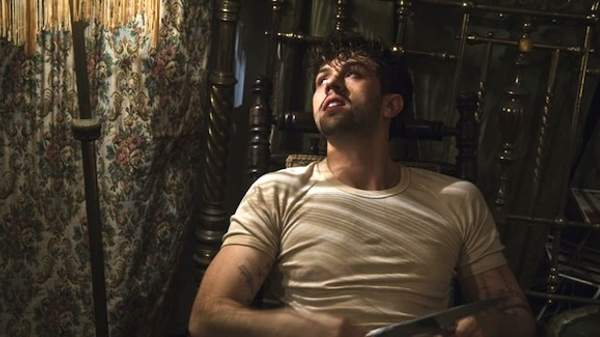Overview
Three adult siblings are confined to an attic in their childhood home, devising plans for the murder of their parents and acting out scenes of succeeding and of being found out, of their past life and the ways the crime might be discovered. All three shift rapidly between attitudes and characters as they fight for control of the scenarios that are playing out, seemingly endlessly. The shifts are rapid and jarring, with the audience having to catch up and read a lot into the changes, which heightens the anxiety of the essentially ambiguous actions.
It's never spelled out whether the murders have happened or will happen or are a coping method that has taken over the siblings' lives, and the ability with which the characters shift between stories and roles is both engrossing and shocking as it develops into a narrative that has a logic of madness rather than of fact. The seemingly practised nature of the 'game' in which the three are engaged evinces intense mental control in the ability to manage and engage with the fast-moving and disparate play, but there's also a sense of compulsion in the re-enactment of scenes of abuse that constitute abuse themselves.
The atmosphere of The Criminals, as adapted by Adrian Mitchell from Cuban playwright José Triana's 1965 Night of the Assassins (La noche de los asesinos) is psychologically sweltering. This state is signalled from the outset by a set design by Dylan Tonkin and Emma Kingsbury that looks exactly like you would imagine a 1960s Cuban attic would look, and Jonathan Hindmarsh's costumes are slightly constraining, making the characters appear just a little bit uncomfortable and overheated in a childlike gentility they have literally outgrown.
As the three siblings Lalo, Cuca, and Beba, and their various imaginings of parents and visitors, and the police, actors Rosanna Easton, Emily Morrison, and David Valencia are fascinating to watch. There's a dynamic pull between the trio such that each one's movement almost seems to physically cause the others to respond and makes the set pieces of the drama they're enacting at times seem ritualised, an effect underpinned by the songs and music interspersed in the mainly naturalistic action.
This element of ritual seems to speak to the allegorical nature of the play, which was banned in Cuba for 30 years due to its implicit criticism of the political situation out of which it emerged. The themes of dominance and rebellion, oppression and struggle, identity and the loss of it that resonate through The Criminals make this specific critique one that can apply more broadly to a number of contemporary political situations but also function successfully as the bounded fictional world of these invented characters.
Under the direction of James Dalton, this production manages to be faithful to its origins without becoming a period piece, and it is deeply troubling and really quite confusing and fascinating all the same.
Image by Lucy Parakhina.
Information
When
Thursday, October 4, 2012 - Sunday, October 21, 2012
Thursday, October 4 - Sunday, October 21, 2012
Where
Old 505 Theatre342 Elizabeth Street
Surry Hills
